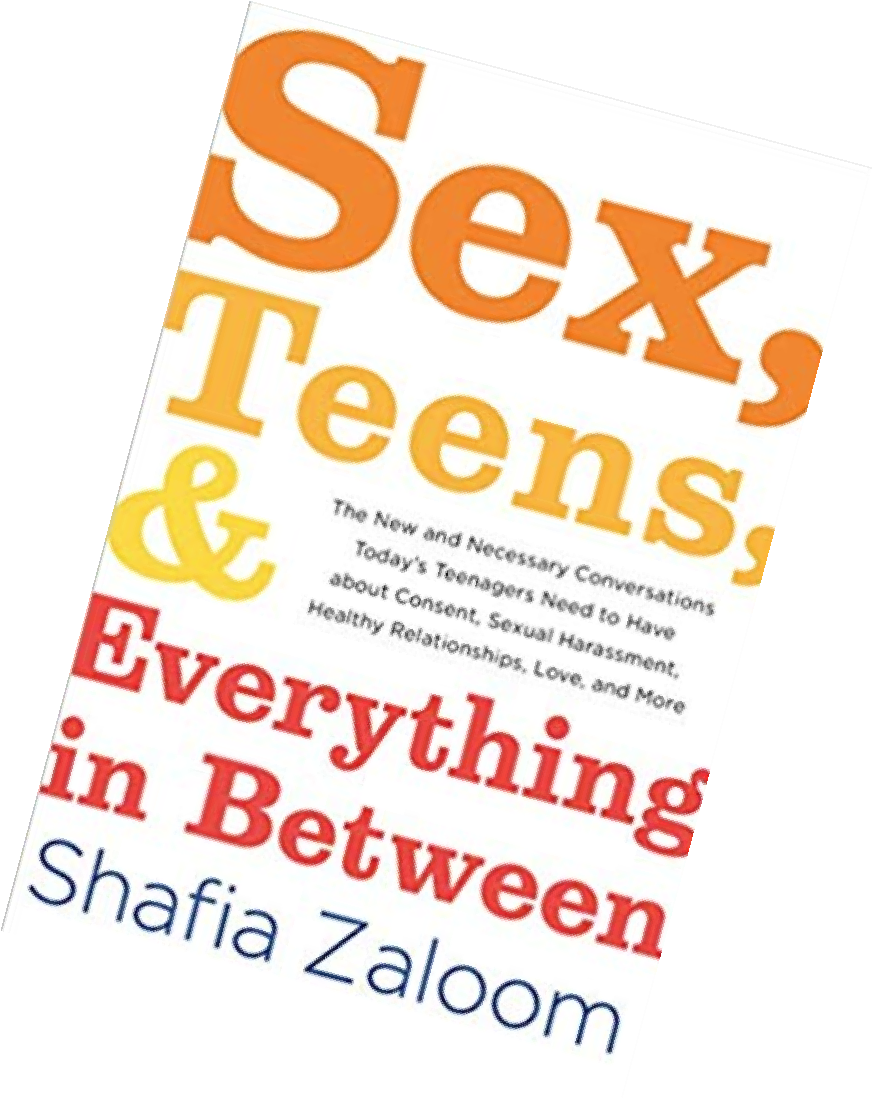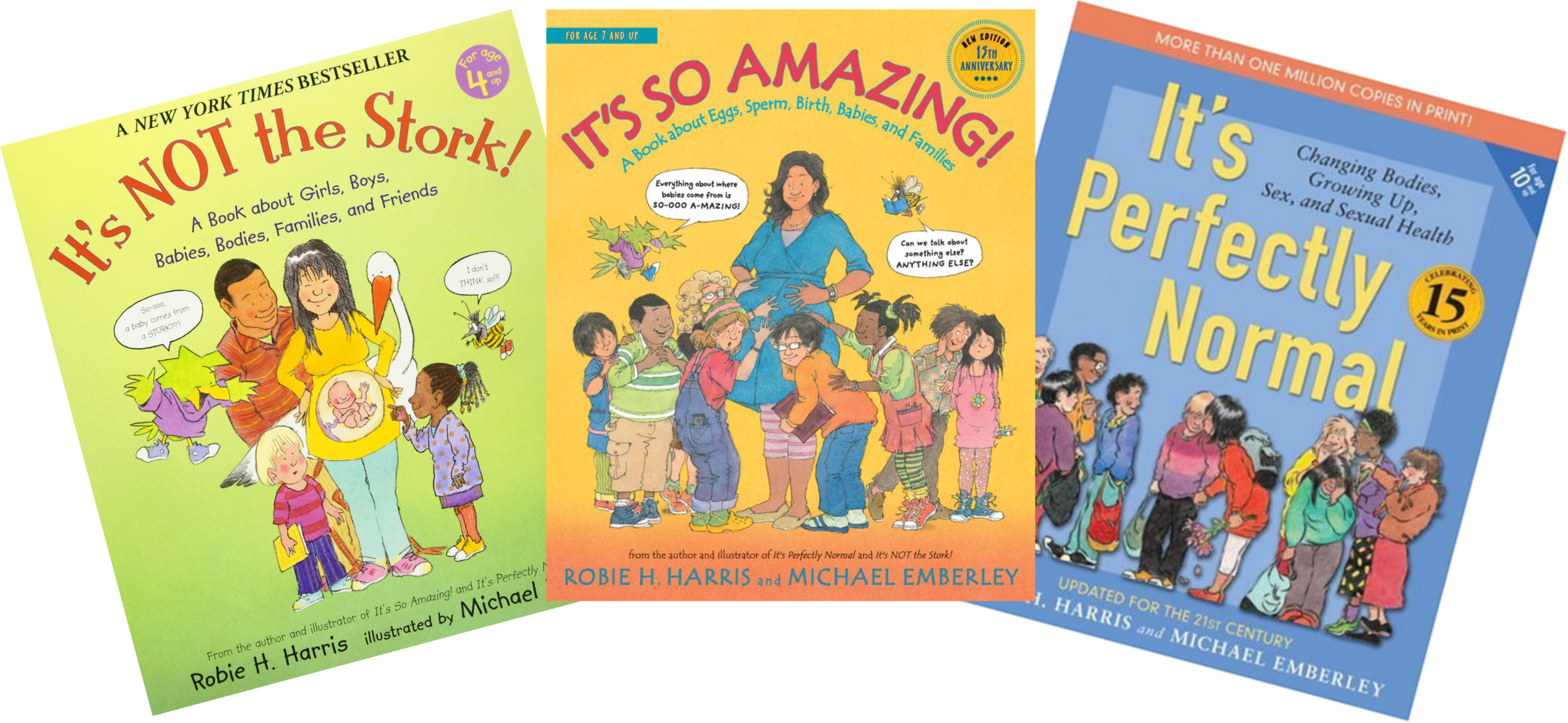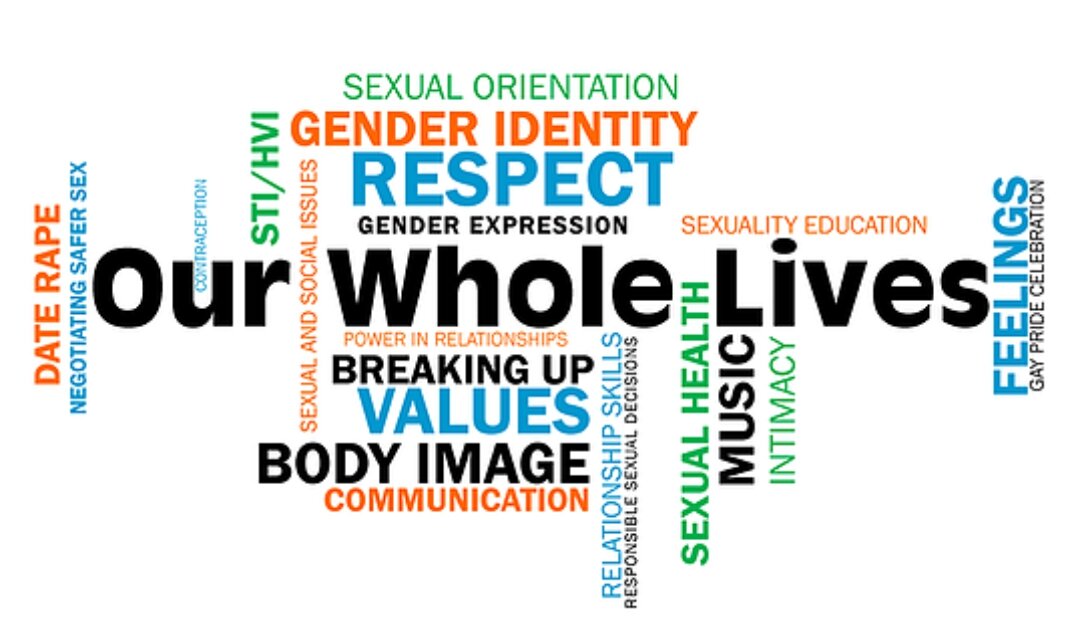RAISING SEXUALLY HEALTHY KIDS
A (PARTIAL AND SOMEWHAT DISORGANIZED) RESOURCE LIST
GENERAL SEX ED RESOURCES:
FOR PARENTS, EDUCATORS AND OTHER ADULTS WORKING WITH OR RAISING CHILDREN
For those working with/parenting kids of all ages:
Well, obviously, Girls & Sex,, Boys & Sex as well as my TED Talk inspired by the book.
I know you want a script. I can’t give you one but Talk With Your Kids comes close, offering ideas for every age, gender, sexuality etc.
Planned Parenthood has excellent age-based “Tool Kits.”
Talk to Me First. is for anyone who wants to be an "askable parent."
Beyond Birds & Bees argues that normalizing discussions of human sexuality with kids of all ages leads to better health and success as well as creating a foundation for gender equality.
I haven’t read Everything You Never Wanted Your Kids to Know About Sex but a pediatrician friend said it was of great help in formulating her conversations with her patients and doctors often ask me about that.
For pediatricians:
Wondering how to talk to your patients and their parents? See “Sexuality Education for Children and Adolescents” by Cora C. Breuner and Gerri Mattson in Pediatrics (August, 2016). Bright Futures, an intiative by the American Academy of Pediatrics, also has some tip sheets for guidance.
For parents and teachers of kids 0-12:
From Diapers to Dating Written by a Unitarian Universalist minister and former head of the Sexual Information and Education Council of the U.S., this book is organized developmentally by age. It is both practical and comforting.
For parents and teachers of teens:
Sex Teens & Everything in Between is the essential read for parents as well as teens of any gender
Yes, Your Kid! is invaluable. Truly one of the best books on talking to teens about sex that I have ever read.
Everyone, parents, teens, educators, doctors needs to read the essay, “An Immodest Proposal” IMMEDIATELY. NOW! DON’T WAIT! CLICK!!!!!!
For Goodness Sex is by the educator who coined the pizza metaphor! Progressive and inclusive it promotes healthy sexuality, values, and body image.
"The Talk: How Adults Can Promote Young People's Healthy Relationships and Prevent Misogyny and Harassment." A must read report from Making Caring Common with great data--and great solutions. They also offer a free webinar on giving “The Talk” (And check out their video series on “Teens and Ethical Romantic Relationships”).
Challenging Casanova debunks the myth of the sex-crazed teen boy.
10 Tips on Talking About Healthy Relationships with Teens from Futures Without Violence is just that.
Break the Cycle’s resources how to talk about dating violence and healthy relationships.
Breaking Up is Hard to Do It really is. So here’s some advice on how to help your child engage in best break-up practices (Tip: don't do it via text)
Here's another list of recommendations from Ronnie's Awesome List.
RESOURCES TO GIVE DIRECTLY TO CHILDREN AND PRE-TEENS
Ages 3+-12
With The Science of Babies, Deborah Roffman (author of Talk To Me First, above) has published the first ever board book that parents can read with children as young as 3.5 to help them start talking about bodies, birth, and families in an inclusive, scientific and normalized way—before it becomes taboo! LOVE this book!
Any of the books by Robie Harris: It's Not the Stork (ages preschool-3rd grade); It's So Amazing (kindergarten-4th grade) and It's Perfectly Normal (1st grade and up). These are the books to have on hand before your child asks, "Where did I come from?"
What Makes A Baby is a wonderfully inclusive book for little ones on conception, gestation and birth.
Sex is a Funny Word is a classic—inclusive, funny, vibrantly illustrated—for kids 8-10. It’s by Cory Silverberg whose book for 3-5 year olds, What Makes a Baby , is also great,
Grades 5-7
AMAZE.org has fun, animated videos that give all the answers kids actually want about bodies, relationships, sex and even porn.
Again, Cory Silverberg! His 2022 book, You Know, Sex , is broadly inclusive of ethnicity, gender identity, and those who are differently abled. Appropriate for ages 10+
The Every Body Book is a fully inclusive book on sex, gender and relationships.
If you want to really step up, believe in sex-positive education, and truly recognize that the more information your child has the better, take a deep breath and turn on the English subtitles for Norway’s Pubertet . It is fabulous and it is explicit—you will see real vulvas, real penises, demonstrations of intercourse (with replicas of genitals) , frank discussions of masturbation, the clitoris, diverse sexual orientations . The show was broadcast for 8-12 year olds. And it is great: exactly what I would wish for . So again if you value medically accurate, pleasure-based info (as opposed to having your child try to learn about sex from pornography) this is what you need.
What's Happening to My Body (get both the girl and boy versions regardless of your child's gender!) is an excellent resources for kids on the ch-ch-ch-changes they are going (or are about to go) through.
Pre-Teen
Dating Smarts: What Every Teen Needs To Know To Date, Relate Or Wait is a great primer.
RESOURCES TO PROVIDE HIGH SCHOOL & COLLEGE STUDENTS
Books
S.E.X.: The All-You-Need-To-Know Sexuality Guide to Get You Through Your Teens and Twenties This is the Our Bodies, Ourselves for a new generation. Along with Sex Teens & Everything in Between the most crucial book to have in your library.
American Hookup is my favorite book on hookup culture--and how it might become more benevolent.
We often say that hook-up culture is dominated by the white and affluent. But what does it mean for students of color and those who are less affluent? They are the ones, this important book argues, left Paying for the Party
Becoming Cliterate: Why Orgasm Equality Matters-and How to Get it offers concrete advice on how to address the “orgasm gap.”
For specifics on navigating sex and relationships as a teenage guy (in addition to the resources above for all teens) Check out Dating and Sex: A Guide for the 21st Century Teen Boy and Respect, which is by a Swedish health educator. Also “She Comes First,” a guide for men about female pleasure, counters the porn narrative—great for both the young and the not-so-young. Guys, trust me: every partner you ever have will thank you for reading this book.
Speaking of countering the porn narrative, Emily Nagoski (see below) suggests feminist-inflected romance novels as an alternative (here’s a list to start with). I know. Sounds weird. But the romance genre isn’t what it used to be: the sex scenes are both satisfyingly explicit and emphasize mutual pleasure.
Online Resources
Heather Corinna (author of S.E.X., above) is the producer of the equally excellent web resource, Scarleteen. Progressive, accurate and friendly sex education and information for teens and young adults!
sexetc.org, is a site by teens and for teens that offers info on birth control, condoms, HIV/AIDS & STDs, pregnancy and more.
Go Ask Alice, Alice is not one person, but a team of Columbia University health care specialists along with a staff of researchers and writers.
Six Minute Sex Ed (which has multiple audio episodes) explains it all for you, as does the video series Sexplanations.
I worship Emily Nagoski. Check out both of her TED talks, "Unlocking the Door to Your Own Sexual Well-Being," and “The Truth About Unwanted Arousal” as well as her amazing, life-changing book Come As You Are.
OMGYes is a subscription-based service on the science of female pleasure. You are supposed to be over 18 to watch its videos, which are explicit, but not pornographic (or maybe sexual but not sexist) and in which real women discuss and demonstrate techniques that enhance pleasure and orgasm. SO MUCH BETTER than letting your teen learn from watching porn, isn't it?
This is a great clip about sexual racism: the gender and racial stereotypes that marginalize African American women and Asian men as romantic and sexual partners.
LGBTQA SPECIFIC
For Parents:
This is a Book for Parents of Gay Kids is exactly what it sounds like.
Unconditional: A Guide to Loving and Supporting Your LGBTQ Child because that is what every child deserves!
Seattle Children’s Hospital Research Foundation offers this guidance on raising gay and bisexual teens
Raising the Gender Creative Child will help you nurture and support children whose identity is not defined by their birth certificates.
I am Jazz is a fab picture book based on the life of trans activist Jazz Jennings.
From the Family Acceptance Project
The Family Acceptance Project has wonderful material for those whose religious beliefs or cultural heritage feels in conflict with their child's sexuality.
Please don’t forget: all the info on consent and dating violence applies to LGBTQ+ kids as well—in fact rates of dating violence among such teens are higher than among their cis/hetero peers!
Therapists and physicians might want to check this resource on gender inclusive language when talking to clients or patients.
For young people themselves (regardless of orientation or gender identity), The Pride Guide is an excellent resource as are This Book is Gay and Queer, 2nd ed: The Ultimate LGBT Guide for Teens Also, most of the books etc in the general sections here are inclusive. Also check out more from Advocates for Youth.
Disability AND Neuro-diversity SPECIFIC
Parentcenterhub has compiled an excellent list of resources for talking about consent, sex, and relationships with children on the autism spectrum; children with cerebral palsy; children who are hearing or vision impaired; children with intellectual disabilities; children with developmental disabilities and more.
The Relationships Decoded curriculum had been found by researchers at UC Davis to improve preparation for romantic relationships among those with neurodevelopmental differences. This information is also vital to preventing abuse: people with intellectual disabilities experience assault at seven times the rate of the general population.
For young people of any gender on the autism spectrum, check out Sexuality and Relationship Education for Children and Adolescents With Autism Spectrum Disorders , Taking Care of Myself (about hygiene puberty etc), When Young People with Intellectual Disabilities and Autism Hit Puberty and Dating When You’re on the Autism Spectrum.
For girls specifically there are a number of resources: Girls Growing up on the Autism Spectrum, What’s Happening to Ellie, Things Ellie Likes, and The Autism Friendly Guide to Periods. For boys, try Things Tom Likes and What’s Happening to Tom.
Boyfriends & Girlfriends: A Guide to Dating for People with Disabilities is, yeah, heteronormative but it’s a start and it’s helpful.
Scarleteen also has excellent, sex-positive series on sex with physical challenges.
CHRISTIAN COMMuniTIES
People I know who grew up in conservative Christian communities highly recommend the book Beyond Shame: Creating a Sex Life on Your Own Terms as one that truly speaks to them.
Progressive Christians (and anyone else who would like a perspective that melds faith, psychology and science) will appreciate Bless This Mess: A Modern Guide to Faith and Parenting in a Chaotic World which includes a lovely chapter on bodies and sex.
Meanwhile, Sex, God & the Conservative Church: Erasing Shame from Sexual Intimacy is great for clinicians treating struggling clients as well as those within Conservative Church communities seeking a positive relationship to sexuality while retaining their faith.
Consent:
From “Everyday Feminism”
C is for Consent is a board book that is great for preschoolers.
For kids 4-9 Consent (For Kids!) is a good one.
Here’s a conversation guide from Confi to talking to older children about sexual assault and consent.
“No ‘I’ in Sex” a great cartoon on masculinity and consent. Especially good for boys!
This comic strip is great, too (curse word-free version here)
As always, Scarleteen is here for you with this thorough explanation for teens.
Here is an excellent, comprehensive rundown on what consent is and what it is not.
Good for teens and emerging adults, and also for parents, educators and other adults who need a better grasp on what they need to communicate.
Videos for teens:
Why consent is like a cup of tea? (this is best for younger kids) . Or maybe you like ping pong better.
Planned Parenthood has a great video series as well as this clear and concise web page on consent.
Another
I also love the F*ck yes video series. It’s R-rated—or maybe a hard PG-13, you judge—which is great because if there was ever a tutorial that made consent sexy , this is it.
Chanel Miller, author of Know My Name
Additional Resources for adults and teens:
Learning Courage is a fantastic resource for educators, advocates and students to help establish best practices for addressing sexual misconduct and abuse in school communities.
Know My Name is the devastating, important book by Chanel Miller, who was assaulted by Brock Turner. It’s a must-read. Minimally , though, everyone (especially teen boys) should hear her read her victim impact statement. You will never be the same.
Another life-changer that all teens should read: this letter published in the Harvard Crimson by the women who were targeted in the sexual “scouting report” circulated by the men’s soccer team.
And for what has been called a “master class on apology” have your kids listen to this episode of This American Life about Dan Harmon, creator of Rick & Morty and Community, who sexually harassed Megan Ganz, a female colleague and attempted to destroy her career. This is what accountability sounds like.
10 Things to End Rape Culture is just what it say it is.
Assault/harassment prevention for educators/advocates: As I said above, I highly recommend Learning Courage for a rundown on best practices for reducing and addressing sexual misconduct. Stop Sexual Assault in Schools has a great tool kit and other resources, including videos on such things as bystander intervention. Also, Who Are You? sells a tool kit on sexual assault prevention and ethical decision-makers (There is also some free content that parents and students can access). And both Green Dot is an evidence-based, comprehensive training to reduce “power based violence” available from middle school onward, though best known for its use on college campuses and the military. University of New Hampshire’s Bringing in the Bystander is another evidence-based curriculum and training program proven to reduce rates of harassment and assault.
Stop Street Harassment provides ideas for community action and education around catcalling.
Love is Respect and Break the Cycle offer resources on dating abuse among high school and college students
Speak About It is based in Maine but does consent and positive sexuality workshops all across the country!
Restorative justice
Impact Justice, a national resource center advancing new ideas for justice reform, offers this outstanding tool kit for those who want to know more about RJ
The University of San Diego Center for Restorative Justice promotes research and training in Restorative Justice in both higher education and K-12 schools.
The Little Book of Restorative Justice is a great place to start in thinking about an RJ program in high school or college.
General Reading AND resources on Boys AND MASCULINITY:
Decoding Boys A pediatrician’s insights into supporting your son through puberty and beyond.
A Better Man Actor, comedian and writer Michael Ian Black writes from the heart about raising good guys.
How to Raise a Boy a guide to raising young men of character who are nurturing, resilient and empathic
Masterminds & Wingmen a groundbreaking book on understanding boys by the author of Queen Bees and Wannabes. Also be sure to check out the companion book for boys themselves, which is fantastic: The Guide: Managing Douchebags, Recruiting Wingmen and Attracting Who You Want
Raising Cain: Protecting the Emotional Life of Boys A classic. For good reason
Real Boys: Rescuing Our Sons from the Myths of Boyhood Again, an absolute classic.
Guyland What I like about Guyland is that it’s about older dudes, just after college, and it shows how all of that gradual masculine conditioning combines to stunt essential emotional growth.
The Crisis of Connection is about boys’ friendships—how they make them, how they long for them, how to preserve them.
The Good Men Project’s web site is a great resource, especially for dads (or other adult male role models).
Here, too, is a tip sheet for parents for raising sons to embrace healthy, positive masculinity. Meanwhile, if you are struggling to explain male privilege: Every Day Feminism to the rescue!
For a more comprehensive, yet easily digestible, discussion of masculinity take a peek at Is Masculinity Toxic.
Of course, you and your boys must watch Tony Porter’s TED Talk, “A Call to Men.” Check out his organization’s web site as well for training, programs, ideas.
A great film to watch with your son: The Mask You Live In by the makers of the equally wonderful Miss Representation (and now that I think about it, watch both films with all teens!)
If your son is considering going Greek, you (and he) should read Caitlin Flanagan’s article, “The Dark Power of Fraternities.”
Some great support programs for boys:
A Call to Men
Ever Forward
And I strongly encourage you to bring the evidence-based Coaching Boys Into Men to the athletic program in your community, your middle school and high school. Coaches: you can make a huge difference!
SELF-OBJECTIFICATION, BODY IMAGE, MEDIA LITERACY
Videos for teens:
TEDx Video: An Epidemic of Beauty Sickness
“Put Yourself First in a Sexy Way" and “The Sexy Getting Ready Song” from the TV show Crazy Ex-Girlfriend are pointed and funny and definitely PG-13.
Dove “Evolution” video has been around for a long time and is still relevant.
Especially for boys: the trailer for “Wet Dreams and False Images.”
Again, I highly recommend the documentaries Miss Representation and The Mask You Live In.
About Face, Powered By Girl and Spark Movement offer great, intergenerational resources for girls and their adults—plus opportunities for action!.
Girls need to know that vulvas come in all shapes, sizes and colors. Laura Dodsworth’s portraits of 100 Vulvas is a great start. And although I can’t provide you with similar dick pics, here is some info about what is “normal” for a penis.
CLOTHING & DRESS CODES:
Article: The Battle over Dress Codes
Article: Who Gets to Decide What a Girl Should Wear?
Article: Reimagining School Dress Codes
PORN:
How do we talk about porn with our younger kids? I’m so glad you asked. Here are some ideas from Amaze.org!
My 2021 New York Times piece on the need to talk to teens about porn (a great conversation starter).
Want to lead with humor? Watch this “Keep it Real” PSA from New Zealand with your teen. It’s great.
Scarleteen has a great essay for your teen (or pre-teen) to read.
The Great Porn Experiment is another conversation starter.
The documentary Hot Girls Wanted (Age 18+) is a reality check to the "amateur porn industry."
The New York Times Magazine did a cover story on kids and porn.
The website Make Love Not Porn offers a great guide on Porn World vs Real World sex. Super useful for parents and teachers. A way to talk about porn without, you know, looking at porn (though please know that the site itself is not for young people: it is an adult content site). Founder Cindy Gallup gives a great TED Talk on how pornography is distorting how young men think about sex.
Common Sense Media offers these 7 Tips for Talking to Kids About Porn
And Culture Reframed tells you "How to Have the Porn Talk"
This is a useful article from the New York Times also talks about age-appropriate way to talk to your kids.
This Daily Show skit is raunchy and perhaps does not question actual porn as much as it might but it does point out the racism in porn, which is something that teens neither think about nor will find acceptable. Probably older high school and/or college age
SEX ED CURRICULA:
You may be wondering what "comprehensive sexuality education" from a rights-based perspective means, or what it entails. Well, The Guttmacher Institute's got you covered with its fantastic, 9-page, PDF handout!
Population Council's It's All One, a free, human-rights based curriculum for high school students.
Our Whole Lives from the Unitarian/Universalist church, offers curricula for ages 5-68 (and training for leaders). It is available low-cost from the church web site.
Advocates for Youth’s Rights. Respect. Responsibility is excellent and available free in English and Spanish)
Our Whole Lives, a sexuality education curriculum by The Unitarian Universalist Association is the gold standard, and available to all, with or without the optional religious supplement, at a nominal fee.
How Do You Tell if Someone Wants to Have Sex With You? This curriculum is free and includes some terrific videos.
Who Are You? A free toolkit that uses group exercises and a short film to help young people, 15+ about the prevention of sexual violence and ethical decision making.
GSLEN offers resources and curricula for ensuring your classes are inclusive of all sexual orientations and gender identitites.
For more IDEAS, CHECK out This list of resources from the Center for Sex Education
FABULOUS SPEAKERS FOR YOUR SCHOOL OR COMMUNITY GROUP:
Charis Denison, featured in the final chapter of Girls & Sex, is a national consultant with decades of classroom experience working with teenagers. She is available to consult with schools, community groups and private individuals/groups.
Shafia Zaloom is another educator with decades of classroom experience and author of Sex Teens & Everything in Between. She currently teaches part time at Urban High School in San Francisco and is particularly effective on consent, ethics, pleasure and porn education
Cindy Pierce is not only a fantastic speaker on issues of sex, respect, porn and healthy relationships, she’s a former stand-up comedian, so funny. Here’s her TED Talk.
Deborah Roffman is great on talking to adults about how to be an “askable parent.”
Al Vernacchio, who invented the famous pizza metaphor for sex is an outstanding speaker for any community.
Don McPherson, author of the book You Throw Like a Girl, is a former NFL player who connects beautifully with boys.
So does filmmaker Byron Hurt whose many documentaries include such topics as masculinity, hip-hop and more.










